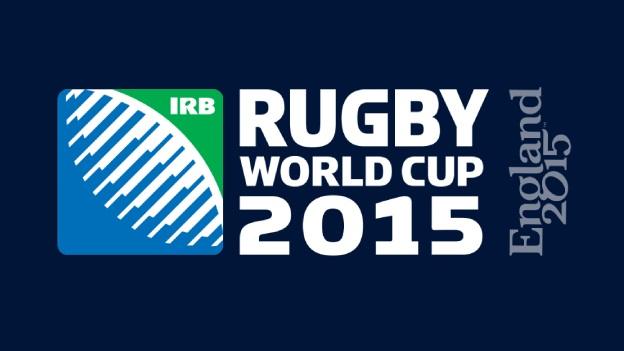Rugby World Cup 2015: England fail to deliver - again
- Published
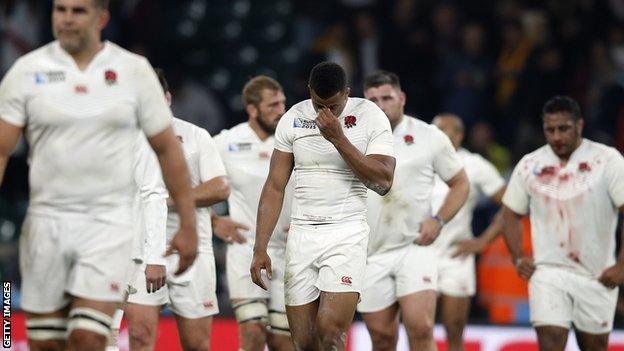
England had won three of their past four matches against Australia at Twickenham before Saturday's defeat
Rugby World Cup |
|---|
Hosts: England Dates: 18 September-31 October |
Coverage: Live on BBC Radio 5 live and sports extra, plus live text commentary on every match on the BBC Sport website. |
Further coverage: BBC Radio Wales, BBC Radio Cymru, BBC Radio Scotland, BBC Radio Ulster and BBC Local Radio. |
Can hosts go home early? England will watch the knockout stages of their home World Cup continue without them after their defeat by Australia on Saturday.
There are no such worries for Wales and Ireland, who are already through to the last eight, and Scotland look set to join them despite being outmuscled by South Africa.
So what does the future hold for those still in action and those starting the inquest?
England pay for cavalier approach
By the end of the game, I was applauding Australia's brilliance while coming to terms with the enormity of England failing to make the knockout stages - the first host nation to fail to do so in the tournament's history.
I was not angry at the final whistle - just slightly gobsmacked at the 33-13 scoreline.
Three tries to one and a 20-point winning margin was, however, a fair reflection of the two teams' performances on the night.
In my match preview column I suggested the strategy should be the same as 10 months before when the teams met in the autumn internationals.
On that day England kicked out of hand all afternoon, dominated the set-piece and won 26-17.
The less breakdowns, the less influence David Pocock would have in a game.
You cannot keep a world-class player out of reach all of the time, but you can limit his impact by the way you play.
Pocock only needs the smallest gap of daylight and as soon as a player got a yard away from his support, England risked losing the ball.
The scrum did not do as well as expected, but I thought England could have caught and driven more line-outs.
The plan appeared to be to throw ball off the top of the line-out and attack Australia, which was bold.
Lacking organisation, killer instinct... and a coach?
The time it takes for England to get realigned into a formation from which they are comfortable to attack has been a legacy of this era.
It must have been infuriating for the coaches to see the ball popped from a breakdown to a forward who is stood almost still, isolated and not really expecting the ball or really understanding where he should be.
Reaction to England's World Cup exit |
|---|
You do not see many All Blacks stood in those positions.
Quick ball, poorly kicked ball or first-phase ball is the best to attack from.
From regular-phase ball you need good decision-makers with runners coming at pace and on angles to give the playmaker options.
England just did not have enough of these.
I also overestimated how good this England team are. They have won big games certainly - you think most recently about how they went to Cardiff and beat Wales in the opening round of this season's Six Nations.
But you could never rely on them in those crunch encounters.
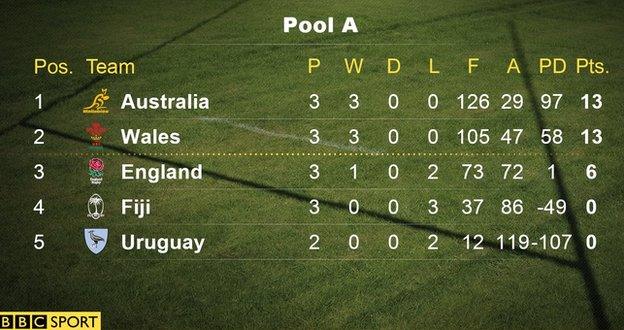
Three weeks after winning in the Millennium Stadium they were comfortably beaten by Ireland in Dublin to end any hopes of a first Grand Slam in 12 years.
That inconsistency of performance gives you perspective. Is this really a team that could win the World Cup?
Head coach Stuart Lancaster and his team will find it difficult to stay after the Uruguay game.
Lancaster has put in place an international training regime of the highest quality and the team's performances need to reflect the investment in players, coaches and facilities.
Four years before lifting the World Cup in 2003, Sir Clive Woodward - one of Lancaster's predecessors - had his position questioned.
He was given another four years after losing a World Cup quarter-final to a strong South Africa side.
This current coaching team, though, have overseen a team which has not been able to get across the line in clutch games.
The deadest of rubbers
At the 1995 World Cup, after losing to a Jonah Lomu-inspired New Zealand in the semi-finals, the England team I was part of played in the third/fourth-place play-off.
We lost 19-9 to France and it was the worst game ever to play in.
The winner of that match earned automatic qualification to the next World Cup in 1999, but that was four years away.
After playing in bruising semi-finals, neither side was interested.
England's final group game against Uruguay, though, will surpass that as the worst game you could play in.
It will be a very hard job to lift the dressing room with nothing on the line in the tournament and the inquest having already started into England's failure.
Wales shrug off injuries and inconvenience
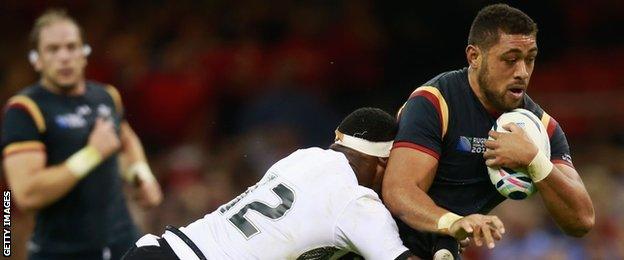
Taulupe Faletau made 12 carries against Fiji - the joint-highest of any Wales player
Leigh Halfpenny, Rhys Webb, Cory Allen, Scott Williams, Hallam Amos - Wales' injury list is lengthy and illustrious.
To make the quarter-finals from such a difficult group, through such adversity, is a fantastic achievement.
It was hard-fought and fully deserved, with Wales' key men stepping up to be counted.
Fly-half Dan Biggar has been one of Wales' best performers in the tournament. The back row of Taulupe Faletau, Sam Warburton and Dan Lydiate have been tireless in attack and defence.
Scrum-half Gareth Davies only made his first start in their World Cup opener against Uruguay, but has been revealed as a player who can reproduce his best on the world stage under the biggest pressure.
Stalwarts Jamie Roberts, Alun Wyn Jones and Gethin Jenkins have been consistently excellent.
Top of the pops or drawn with the Boks?
If Wales beat Australia on Saturday, they have an enormous opportunity to make the semi-finals with a likely last-eight meeting with Scotland or Japan.
If they lose and finish as Pool A runners-up, they face the far less appetising prospect of an improving South Africa team.
Wales have to overcome the mental scars left by 10 successive losses in their most recent meetings with Australia - six of which have been by fewer than seven points.
But Wales' experience and the versatility of their back row means they are capable of beating Australia.
I would be tempted to play Justin Tipuric at open-side flanker in this game to compete like-for-like with Australia's breakdown specialists Michael Hooper and Pocock.
Captain Warburton - who usually occupies the number seven shirt - has not fared too well against Australia in the past.
But to have him at blind-side flanker alongside Tipuric would be as tough a challenge as Hooper and Pocock - if picked - have faced so far.
Scots to coast to last eight
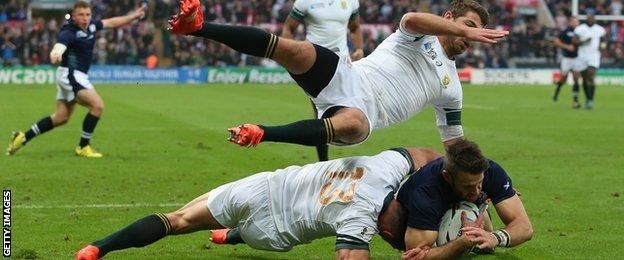
Tommy Seymour scored Scotland's only try against South Africa
South Africa's first-half dominance against Scotland on Saturday gave them a platform for a comfortable win.
And Scotland did not help themselves.
When they had possession, the first receiver from the breakdown was often far too deep.
This gave the Boks defence too much of an advantage. They had space to move up into and smashed Scotland back behind the gain-line regularly.
Scotland were totally dominated in the first half. The second half was better and featured a try from Tommy Seymour that was one of the best I've seen scored by any Scottish team.
Despite Vern Cotter making 11 changes, I thought the Scotland team looked decent on paper and certainly did not embarrass themselves on the pitch.
Prop Gordon Reid put himself about and David Denton and Josh Strauss were strong in the back row.
Samoa's discipline was shocking against Japan. They gave away 19 penalties, were shown three yellow cards and I don't see them posing a serious threat to Scotland's chances of making the last eight when they meet on Saturday.
If Scotland have a simple game plan, keep the game tight to deprive the opposition of targets for their big hits and defend well, Samoa will implode.
Ireland's wake-up call
Ireland's 16-9 win over Italy was exactly the kind of game Joe Schmidt's side needed.
After strolling past Canada and Romania - by 43 and 34-point margins respectively - it was a reminder they are not unbeatable.
It was no surprise it took the arrival of talismanic captain Sergio Parisse for Italy to belatedly turn up at the tournament following a tame defeat by France and narrow win over Canada.
Most clean breaks by home nations' players | ||
|---|---|---|
=1 | Mike Brown (Eng) | 8 |
=1 | Anthony Watson (Eng) | 8 |
2 | Gareth Davies (Wal) | 6 |
3 | Jonny May (Eng) | 5 |
=4 | Stuart Hogg (Sco) | 4 |
=4 | Scott Williams (Wal) | 4 |
=4 | Keith Earls (Ire) | 4 |
Next up for Ireland is a match against France on Sunday, with both sides already sure of progressing to the quarter-finals.
Whoever wins this group definitely gets the easier quarter-final, avoiding the All Blacks, but Argentina are capable of beating either France or Ireland on their day.
France have been impressive without being sensational, but they have a new scrum star in tight-head prop Rabah Slimani, who looks just like team-mate Nicolas Mas.
He is destructive and will give whoever is on the Irish loose-head side a steamy time.
Fly-half Freddie Michalak and centre Wesley Fofana are combining well and if Fofana finds his game, everyone look out.
I feel Ireland have the sign over France though.
Schmidt has this Ireland team in a good headspace and they have enough experienced players performing well that will edge France.
Player of the weekend
Bernard Foley had no decent form coming into the tournament but found his best when it was needed most against England.
Australia coach Michael Cheika has got his man firing. It was an inspiring performance.
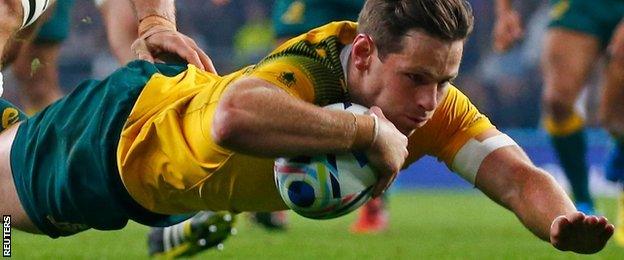
Bernard Foley scored 28 of Australia's 33 points against England
- Published5 October 2015
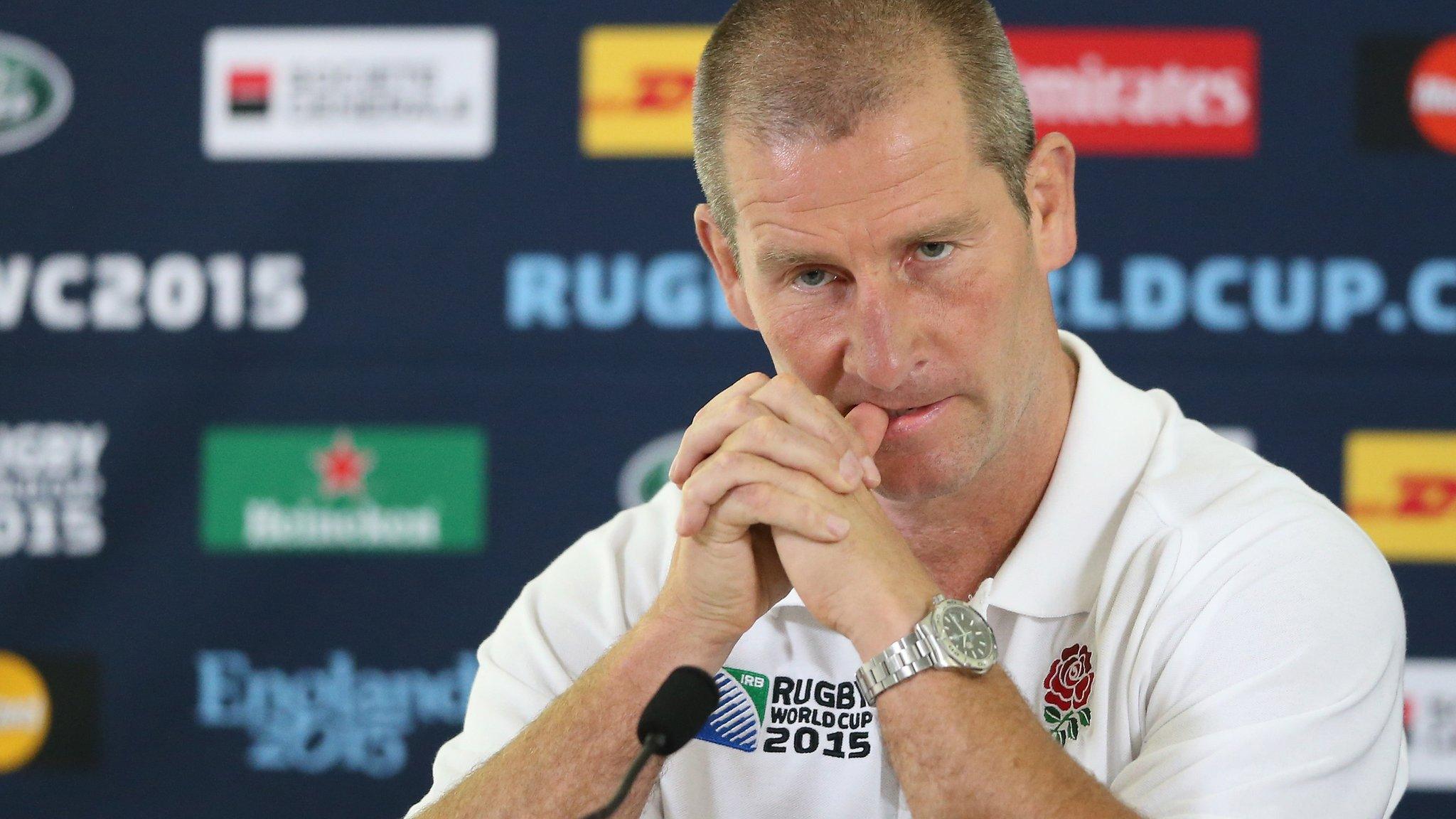
- Published18 September 2015
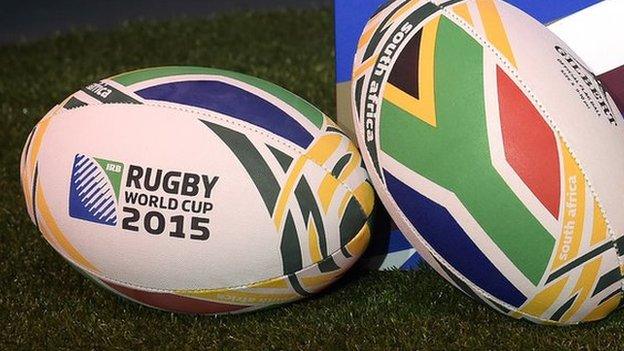
- Published3 February 2017

- Published14 September 2016

- Published15 February 2019

- Published25 September 2015
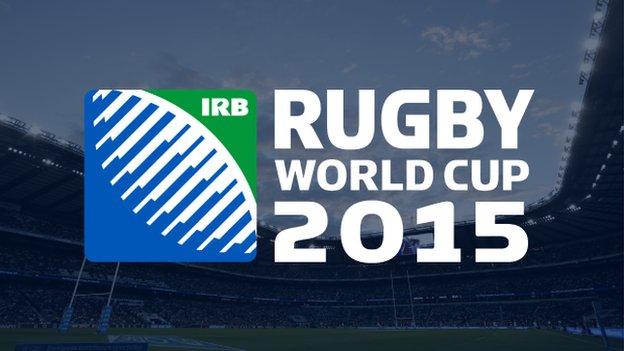
- Published8 September 2015
